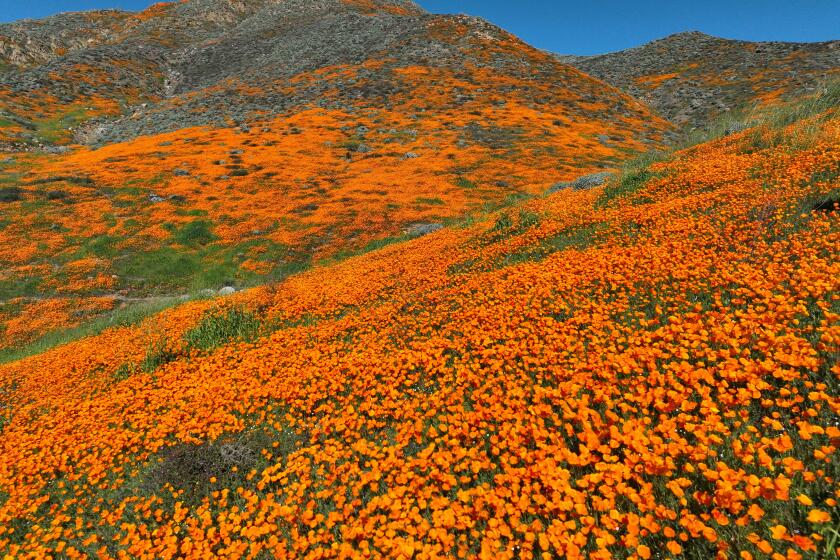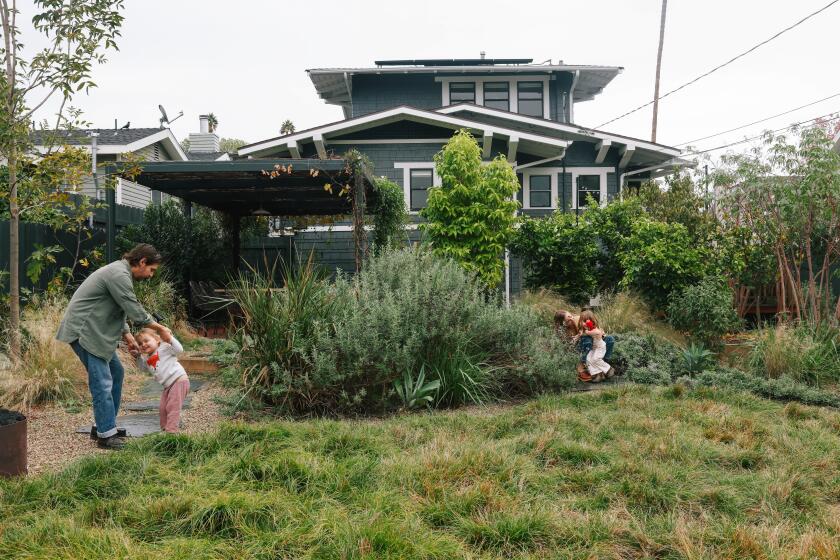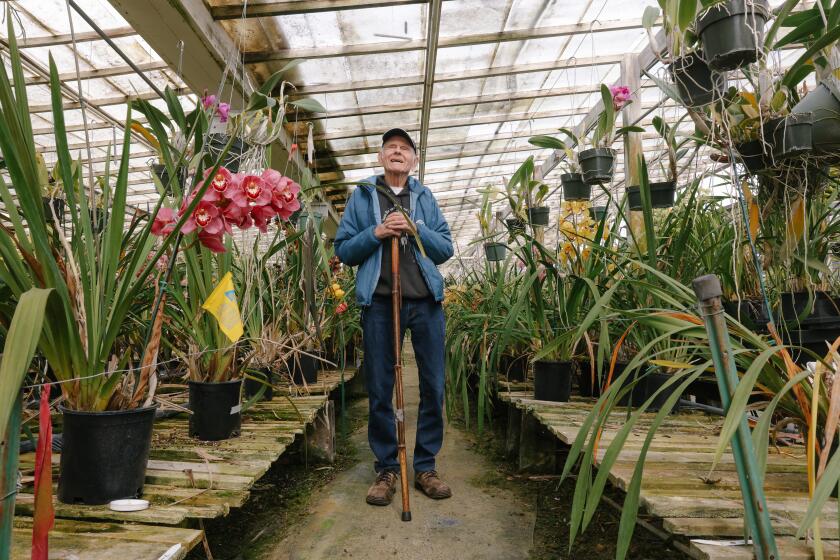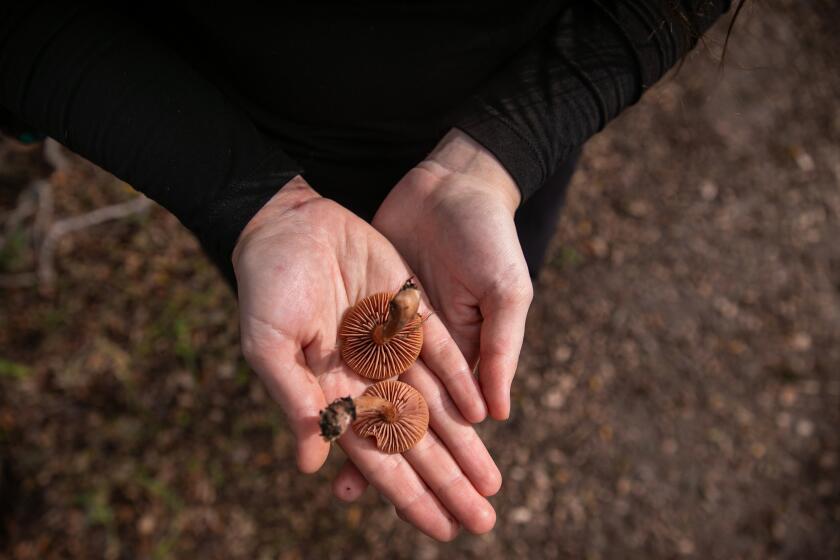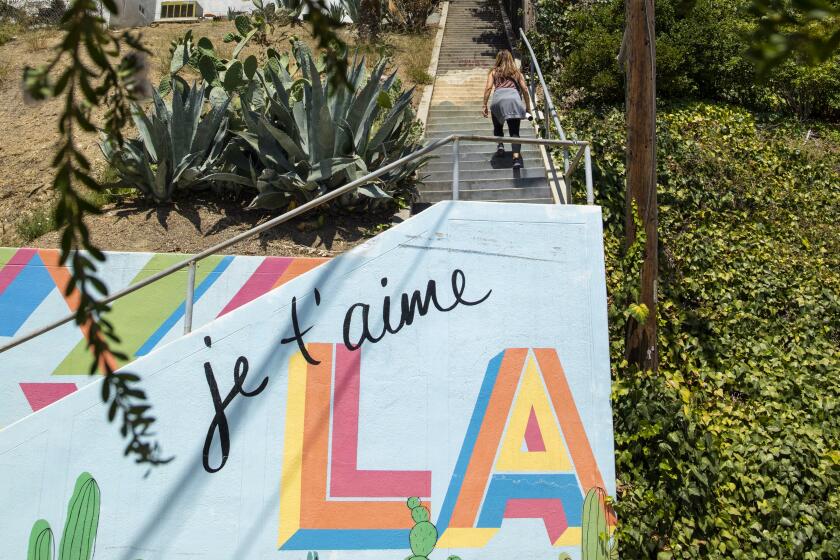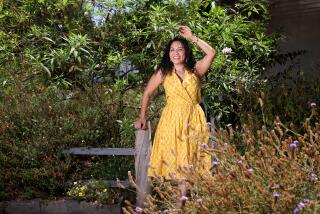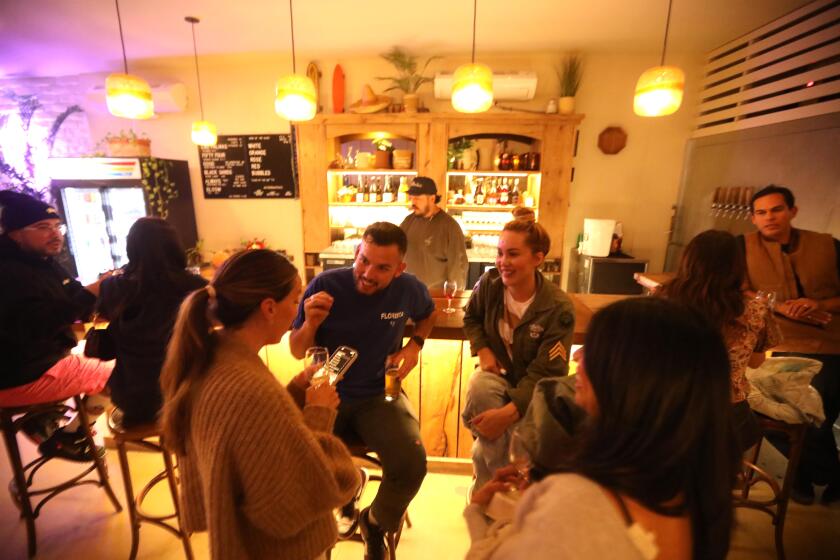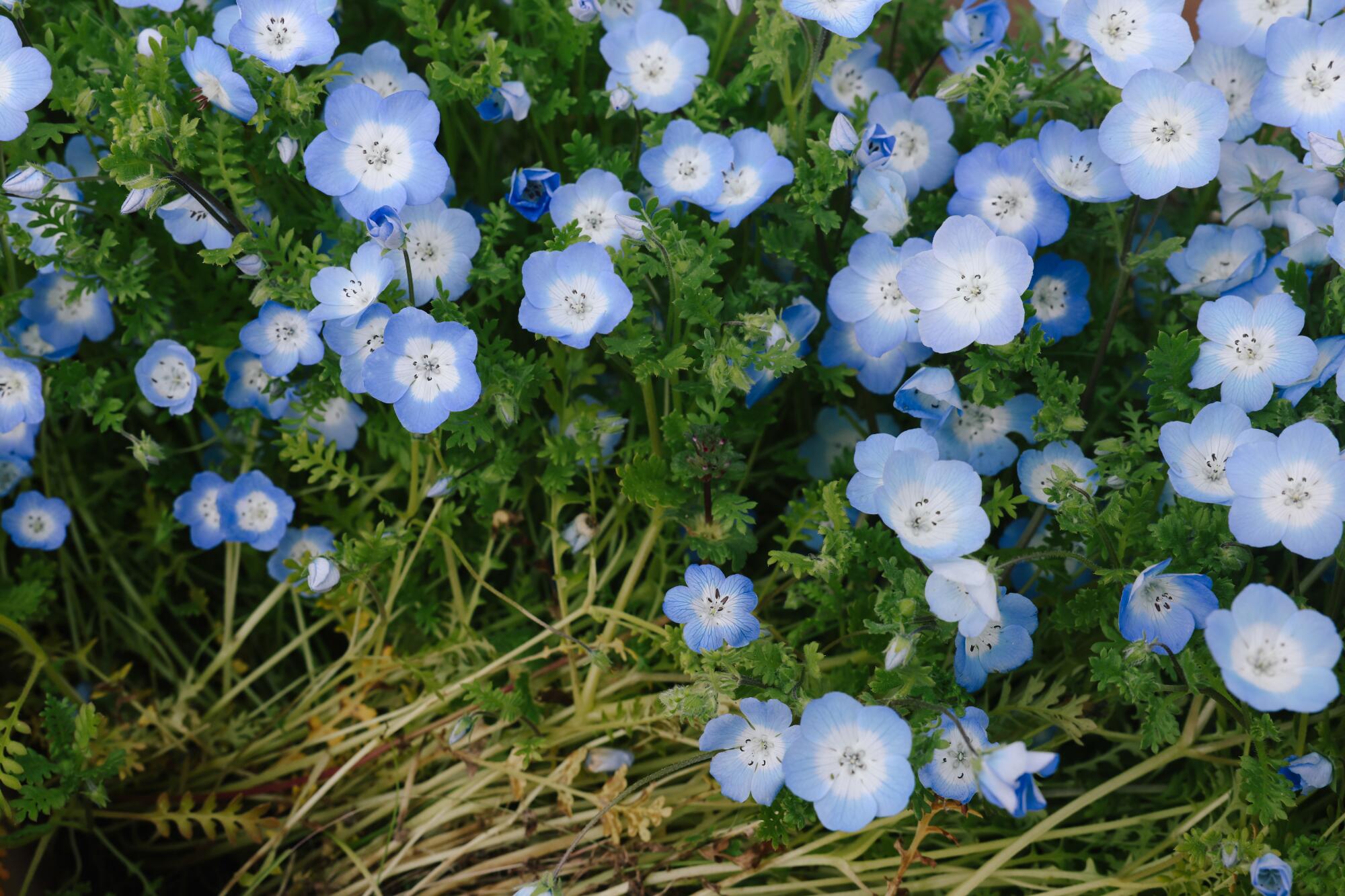
In 1995, when most people considered native plants little more than weeds (if they considered them at all), desert devotee Mike Letteriello peered through a chain-link fence at a patch of bare ground and dreamed up a fragrant, vibrant tribute to California’s diverse native plant communities.
Nearly 30 years later, his dream is a lush reality, with a small waterfall, stream and pond along a meandering path bordered by a stony desert wash, thick chaparral, a flowery meadow and even native shrubs and trees from the Channel Islands bursting with blooms.
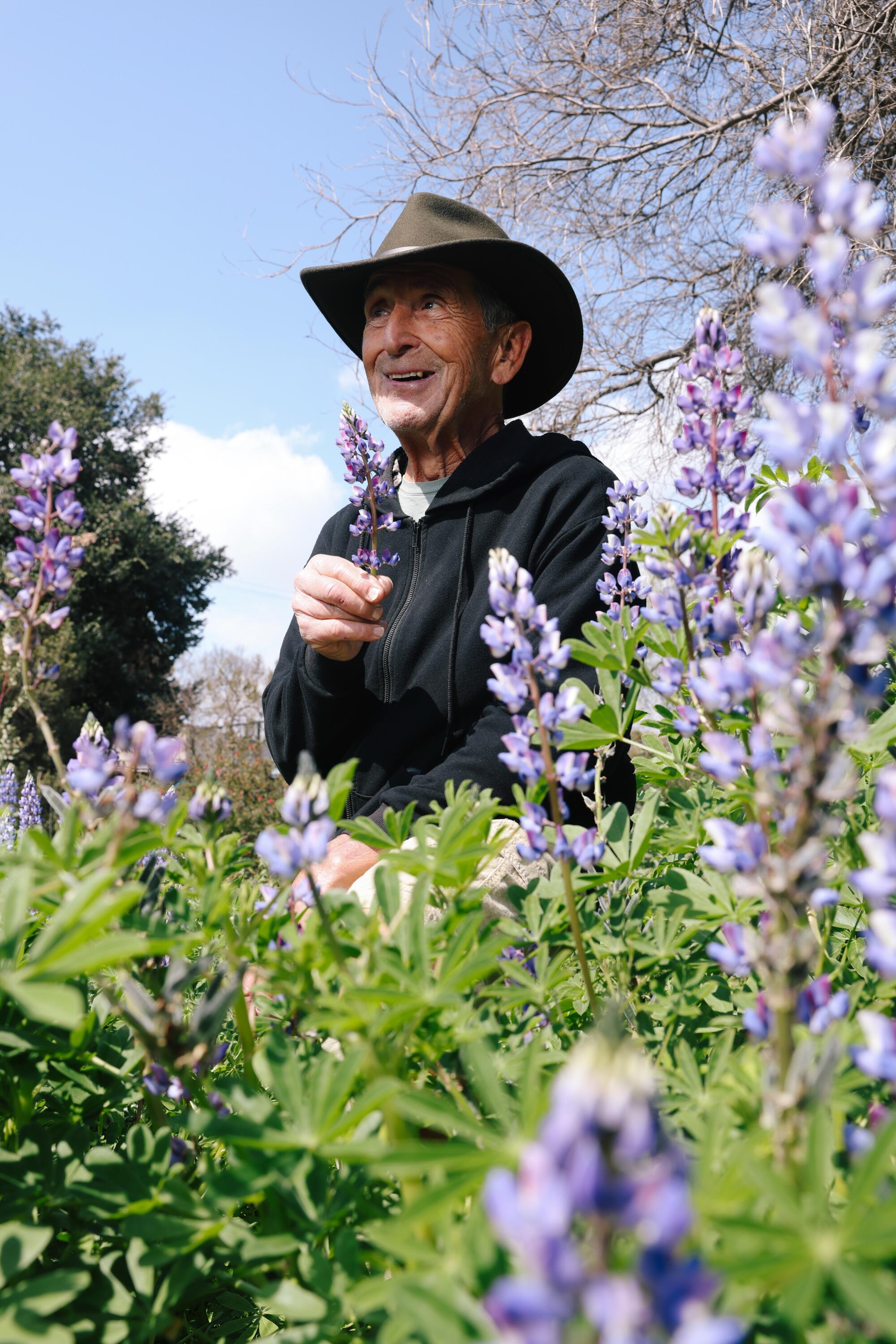
It’s still mostly viewed through a fence because it’s on the grounds of William F. Prisk Elementary School in Long Beach and reserved for students and teachers. But during Southern California’s annual season of spring garden tours, the gates of Prisk Native Garden will be open to the public from 1 to 4 p.m. on March 26 and again on April 2. Admission is free, but “donations will be gladly accepted,” Letteriello said.
The Prisk Native Garden tour is the earliest of more than 16 annual tours of private gardens around SoCal that extend into May, many of which are fundraisers for nonprofit organizations. You can find a list of other tours below, but if you’ve got a free afternoon and an interest in creating native plant habitats, or just wandering through a beautiful and lovingly tended garden of more than 300 mature species of California native plants, a visit to the Prisk garden is well worth your time.
The Theodore Payne Foundation’s annual Wild Flower Hotline returns March 3. Be respectful when you visit, but don’t be ashamed you want to see the bloom.
It was Prisk Elementary science teacher Candy Jennings who first envisioned creating a native plant garden on 7,500 square feet of weeds and dirt at the southwest corner of the school grounds, at East Los Arcos Street and Albury Avenue in Long Beach. She sought advice from the Theodore Payne Foundation — then known as the Theodore Payne Foundation for Wild Flowers & Native Plants — and the foundation staff called Letteriello, a Long Beach painting contractor, native plant enthusiast and avid volunteer.
“They basically said, ‘Mike, can you handle this gal?’ so Candy and I got together, and it was the most fateful outreach you could imagine,” Letteriello said.
“I looked through the fence at flat dirt — a huge blank palette. The only plant was one white alder — Alnus rhombifolia — and I thought, ‘How can I do this?’ I had no master plan at the time, and I’d never designed a big garden. All I’d done was take out the lawn at my house and put in native plants ... but I told her, ‘Let’s just do this and I’ll design it as we go.’”
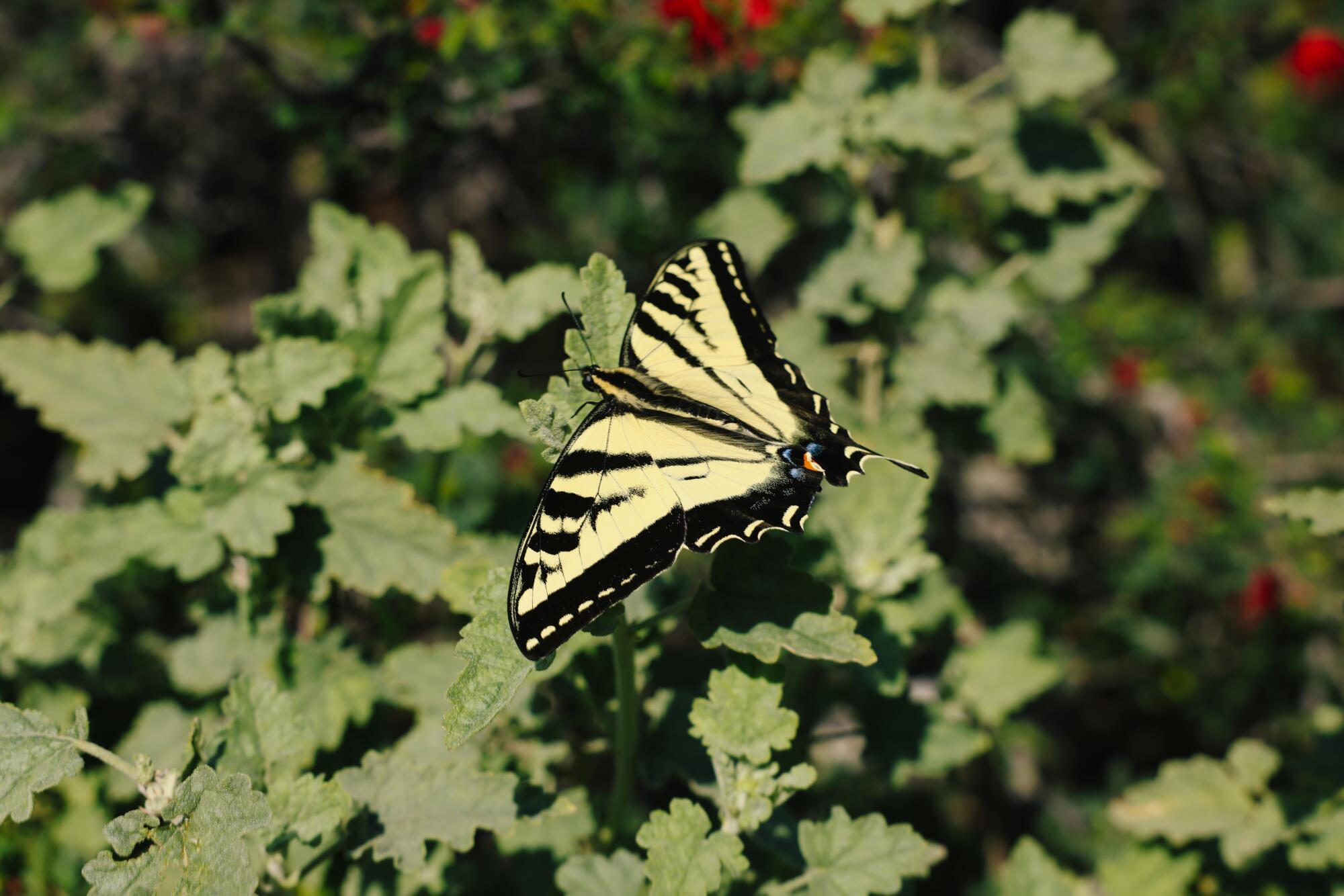
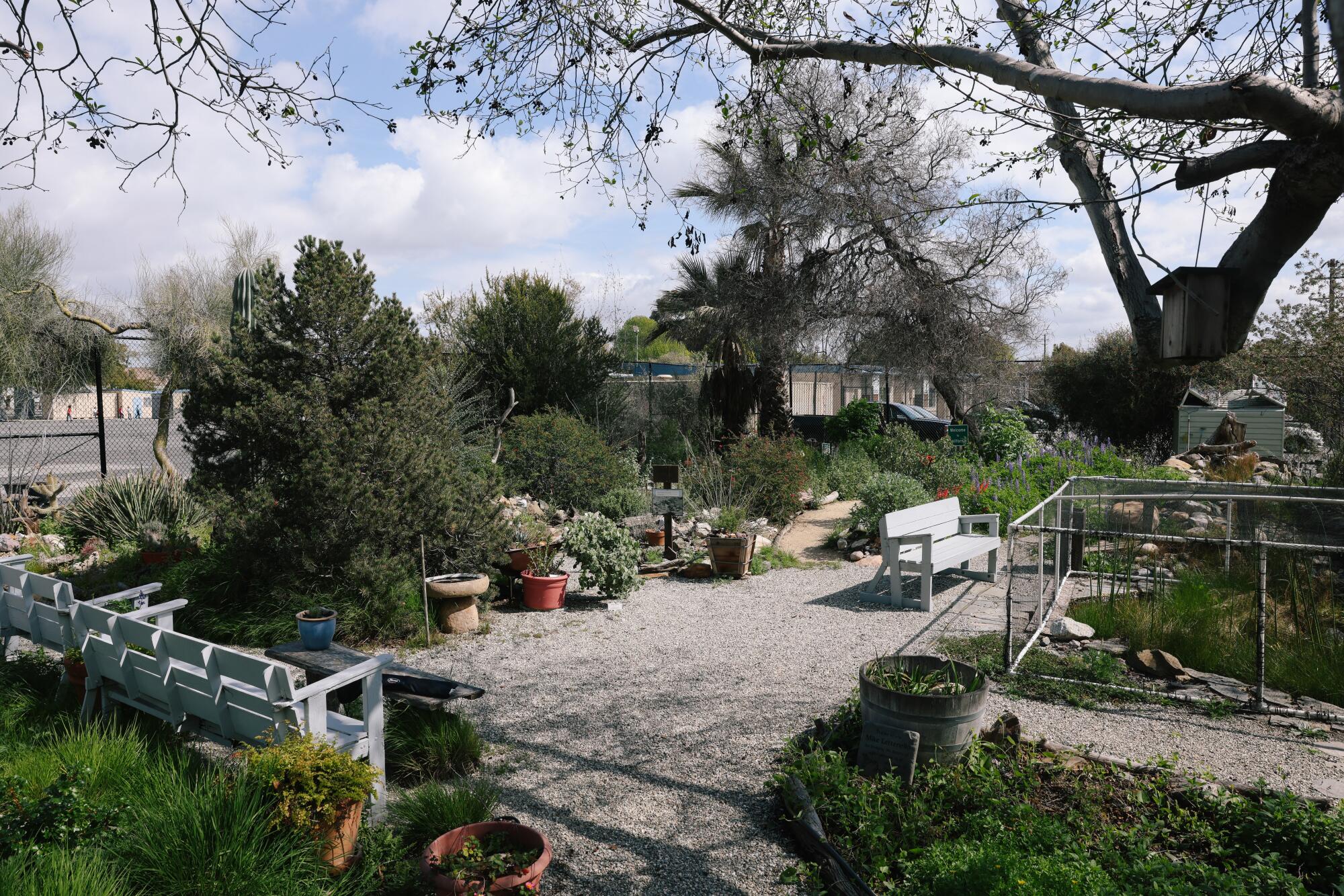
And design he did. He and Jennings, her husband, Alan, and the Jennings’ neighbor, Frank Duroy, took on the job of transforming the dirt into the colorful quilt of habitats it is today. Duroy not only helped with physical labor, Letteriello said, but he became the garden’s benefactor too, providing money for materials, a storage shed and the garden’s “learning arbor,” a sheltered space for classes to learn outside, recently renovated by Long Beach Eagle Scout Kai Cobabe, a Prisk alumnus.
Kyle and Claire Penn pulled out their lawn in Eagle Rock and never looked back. “We haven’t given up anything by not being able to run around on grass,” Kyle says.
Creating the garden was fairly straightforward, Letteriello said, once they came up with the theme.
“The idea was to organize the garden by plant communities,” he said, “like you’re crossing California from the ocean to the desert, through all the biomes and native plant communities — a beach, coastal sage scrub, chaparral, mountain meadow, freshwater creek and marsh, shade garden, desert wash. ... We even included plantings from the Channel Islands.”
Duroy helped pay for a lot of those initial materials, including a good-sized fish pond that he and Letteriello dug themselves. In 2017, Letteriello got a $7,000 grant from the South Coast Chapter of the California Native Plant Society to build a small waterfall and stream that runs into the pond and recirculates back to the waterfall with power from solar panels. By then, Duroy had died and Candy Jennings had retired, so Letteriello did most of that work, again as a volunteer, with his friend Joey Vanoni, who helped him lug in rocks to build the creek.
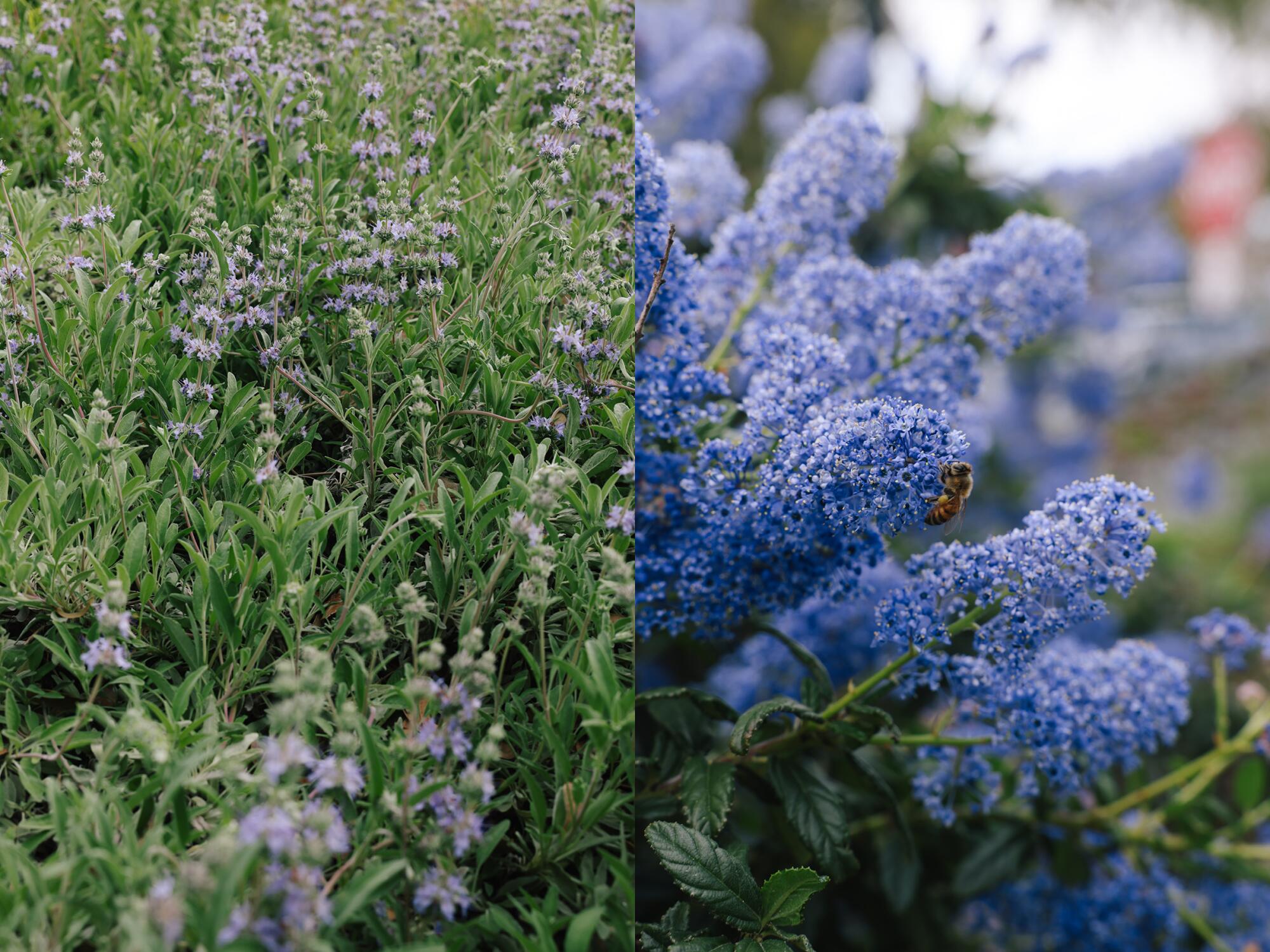
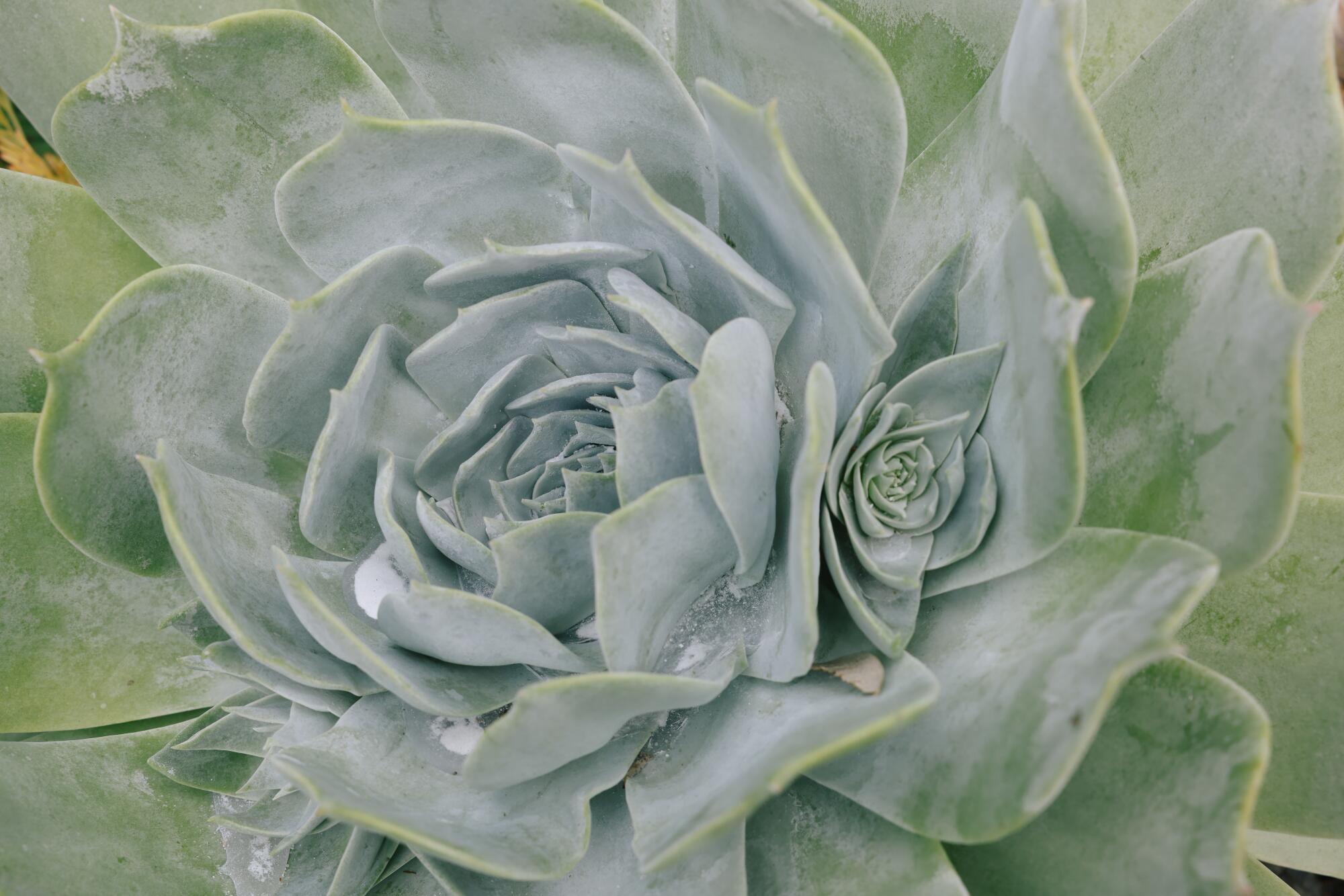
The resulting waterway looks like a natural jumble of logs and rocks created by a small flash flood, with artfully set steps hidden by a profusion of native grasses and shrubs along the banks. Letteriello got permission from state wildlife officials to bring in two dozen native arroyo chub minnows for the pond from San Juan Creek, along the Ortega Highway. The chub have multiplied heartily, but Letteriello has had to erect netting “to keep raccoons from ravaging the pond.” The pond also has one lonely frog that Letteriello hopes to socialize when he brings in tadpoles later in the spring.
The Prisk garden is less than a fifth of an acre, but there’s so much to see, time seems to slow for visitors who get the Letteriello tour because he has a personal story for almost every plant and he’s a stickler for details. The Latin names of the plants he loves roll off his tongue as easily as his stories, which tend to drift as delightfully as his garden paths.
Paul Gripp, 90, helped build the famed Santa Barbara Orchid Estate and will be there sharing tips during the International Orchid Show March 10-12.
For instance, one of the low-growing varieties of sagebrush, Artemisia californica ‘Canyon Gray,’ was found on San Miguel Island, Letteriello said, where it adapted to the strong Channel Island winds by growing close to the ground, much flatter than Artemisia californica’s regular upright form. But with its feathery, silver-green foliage, Canyon Gray sagebrush makes a lovely groundcover for yards, especially since it has the same sharp, savory aroma as the taller plant, and did you know, he said, barely taking a breath, that some Southern California Indigenous peoples would weave sagebrush branches around their necks to serve as a kind of fragrant bug repellent?
Then there’s the sprawling island oak that Letteriello carried back from the Catalina Conservancy as a seedling in a gallon can, cradled in the front seat of his pickup, or the hilly area he created in the center of the garden from donated shale and other rocks — “my homage to the Vasquez Rocks,” he said, the iconic jagged rock formations near Agua Dulce in the high desert off Highway 14, made famous in numerous commercials and television shows.
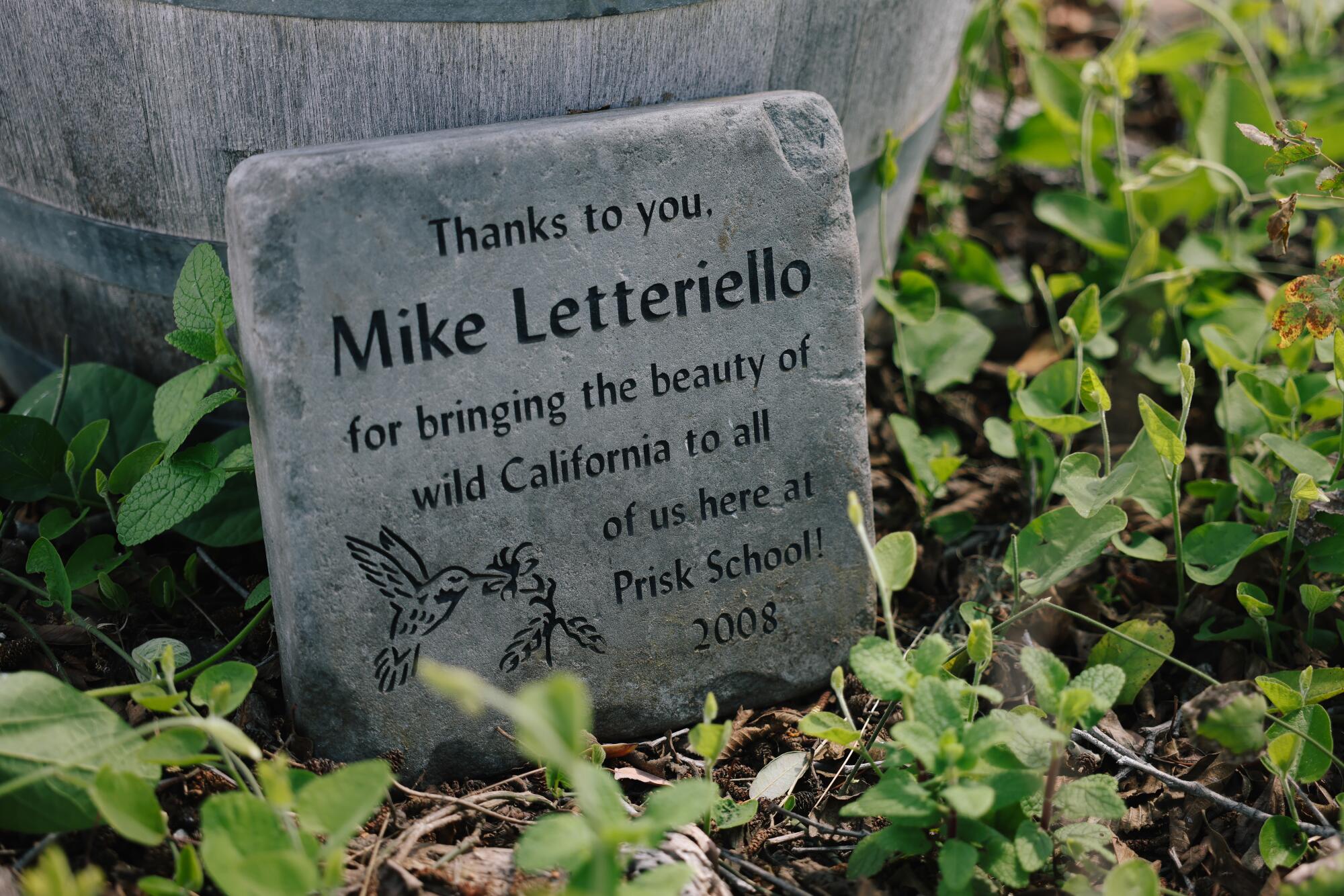
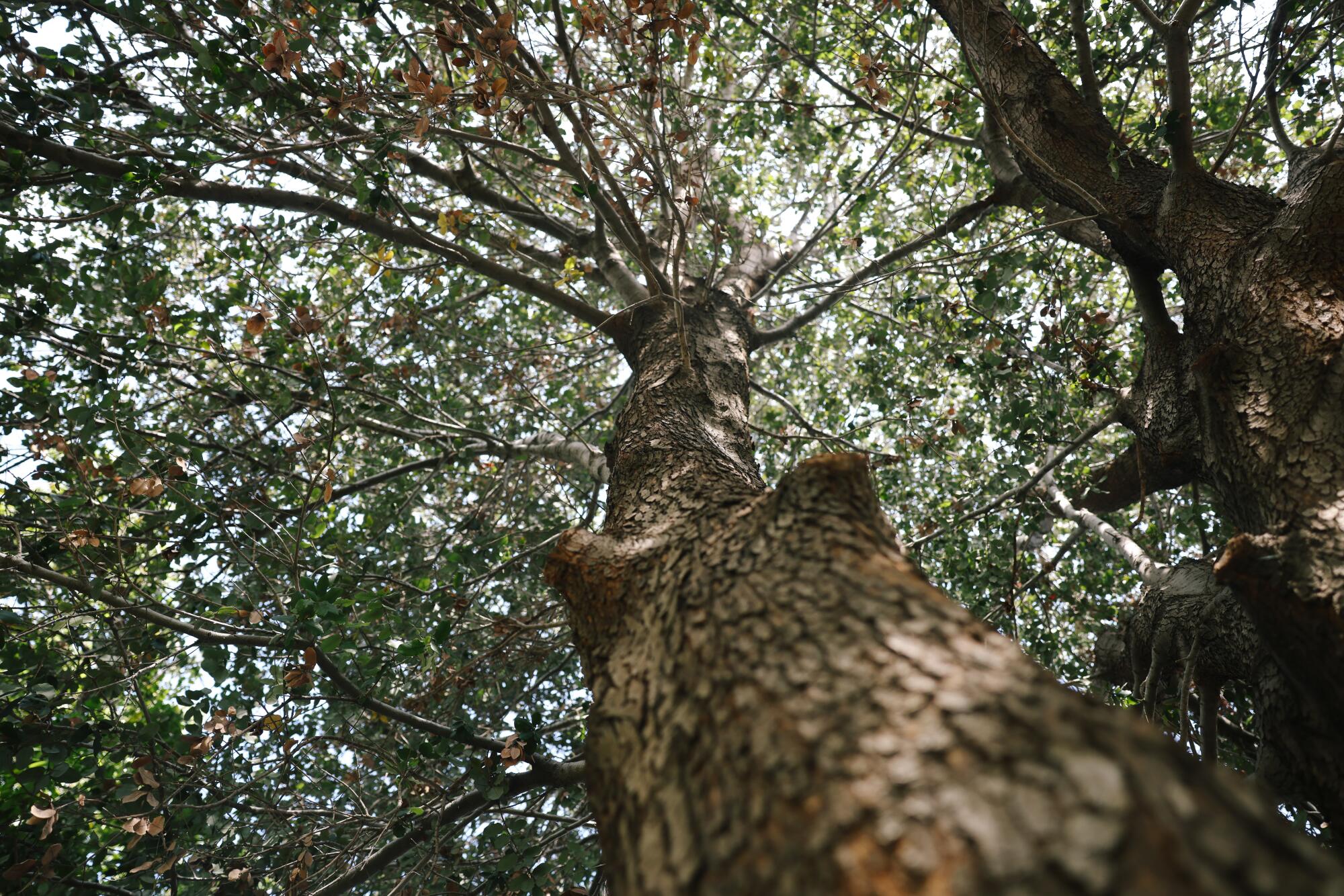
Desert landscapes are what drew Letteriello to native plants in the first place. He loves wandering through desert washes, especially in the Mojave Desert, and tried to create that effect in his yard as well as the desert biome at Prisk. Many people have contributed to create and maintain this garden, but it continues to thrive because Letteriello has made it his life’s work. He doesn’t get any monetary payment as the garden steward, but when the kids run in, clambering over the stones he laid around the stream or squealing with excitement at the sight of a lizard — there are many in the garden — he said he feels well paid.
“One girl opened up her arms and said, ‘I just want to live here.’ Another boy looked at me with delight on his face and said, ‘This is my happy place.’ Those are all spontaneous things they came up with — I couldn’t solicit those comments if I tried, and when I hear them I think, ‘I’ve done my job,’” he said.
“And this isn’t just a garden, it’s a zoo, with the chub and frog and the lizards and all the birds ...,” Letteriello trailed off as a swallowtail butterfly sailed by, almost on cue, to land on a purple-blooming lupine, and he laughed in delighted disbelief. It was just too perfect.
The best tips and tricks for identifying and responsibly gathering fungi in the wild.
Someday, he said, he’d love to expand the Prisk garden into the huge expanse of asphalt behind the school, to create a bigger garden and stream. But more than anything, Letteriello wants to spread the gospel of the benefits of school gardens. He’s creating a nonprofit organization called Wild for Schools to try to build more native plant gardens at schools because he thinks they bring something rare and precious to the students within.
“[Los Angeles Unified School District Superintendent] Alberto Carvalho said, ‘So many kids are caught in concrete jungles; we have a moral obligation to remove them from that,’ and I’m in total agreement,” he said. “It’s therapeutic to immerse children in nature. It calms them down and gets them into the present time, not the past or future. When you get kids in nature, they become highly observational. They start asking, ‘What’s that? What’s this?’ and they’re looking at everything with intense interest. When they stare at a computer, it’s not the same as surrounding kids with aromas, butterflies and lizards, fish and moving water.”
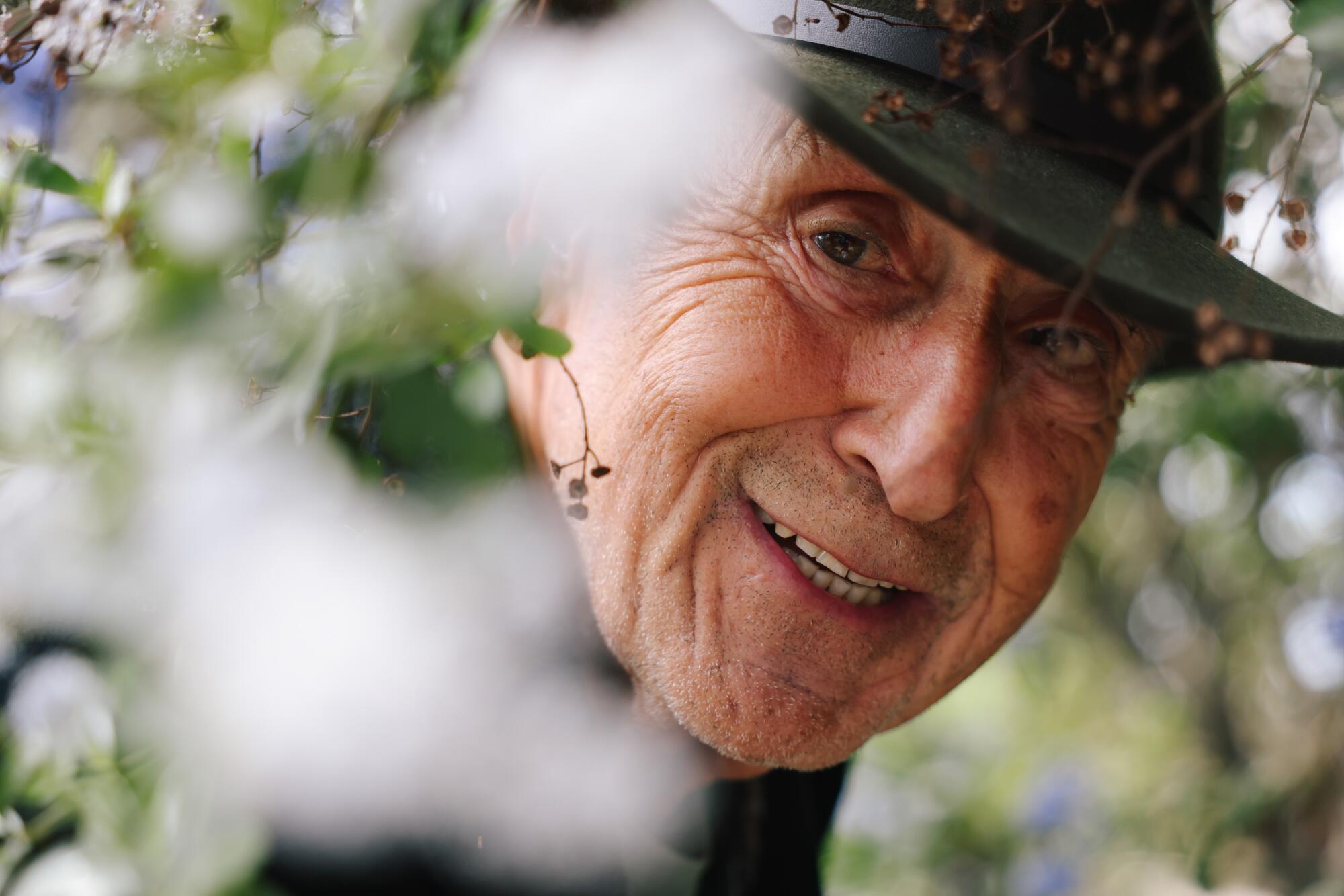
His mission now is to convince financial backers and school leaders that these native plant gardens should be a fixture in every school. There are so many lessons that can be taught here, he said, about plants and biology, the importance of habitat, animals and drought, and how California’s native peoples used the plants around them for food, shelter, medicine and spirituality.
“It’s highly educational, and it connects us with our heritage in California,” he said. “I was born in Pittsburgh, Pennsylvania, to an Italian immigrant family and moved to California when I was a child. I’ve never been to Italy, and I don’t care to go now. I love our mountains and deserts. I’d rather tour California because it’s my home and I’m proud to live here. I want these kids to know we’re unique, this is part of their heritage, and I’m just beginning.”
Los Angeles is full of secret staircases. Here are the outdoor climbs that make great walking or running workouts (and have scenic views).

Clearly, gardens can be intensely personal creations, so if you’re looking to be inspired or just want to satisfy your inner voyeur, there are lots of other garden tours throughout Southern California this spring. Here’s a list of upcoming events:
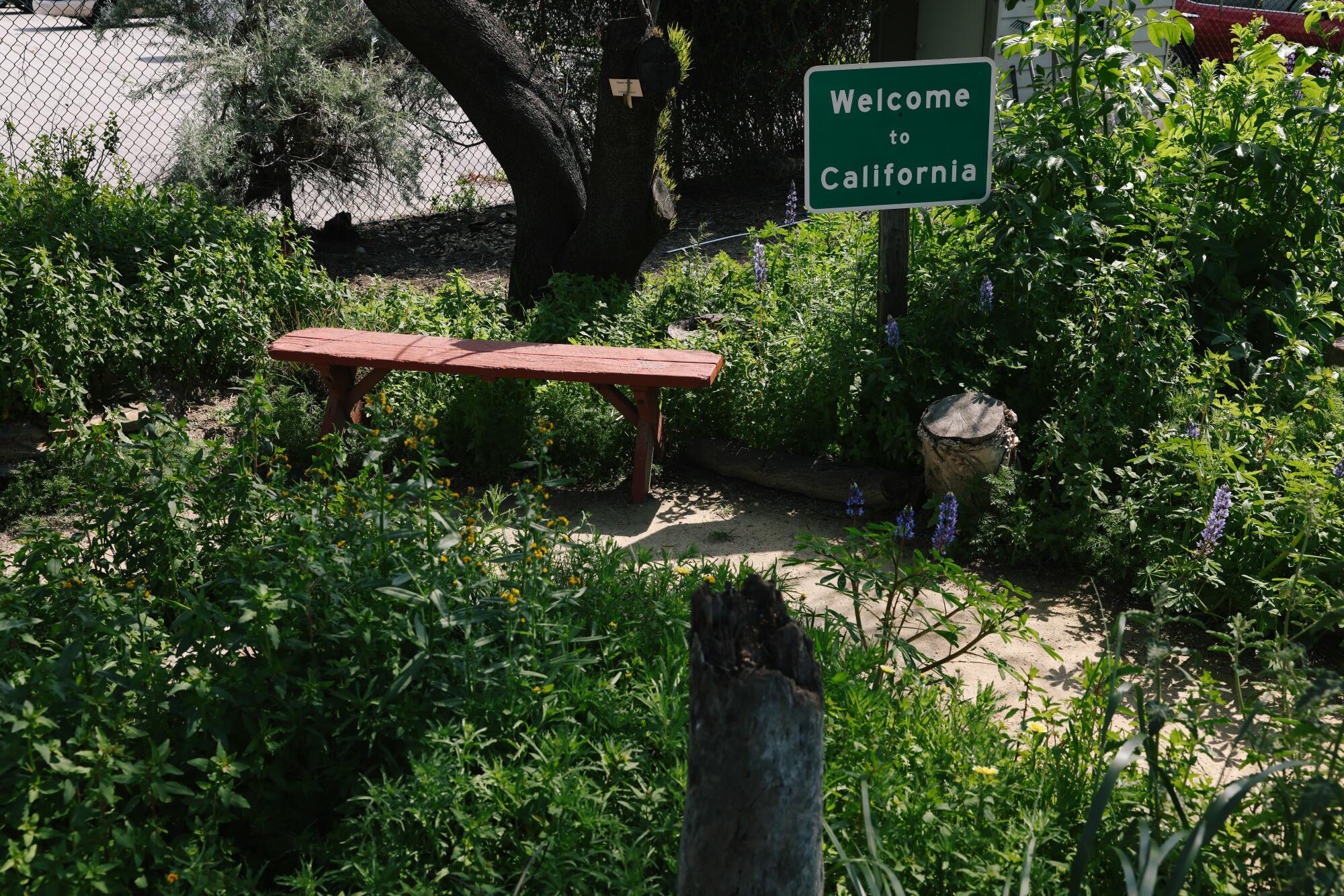
March 26 and April 2
The Prisk Native Plant Garden Open House features a free visit to the native plant garden usually closed to the public. From 1 to 4 p.m. both days at William F. Prisk Elementary School, 2375 Fanwood Ave. in Long Beach. The garden is behind the school, at the corner of East Los Arcos Street and Albury Avenue. facebook.com/prisknativegarden
April 15-16
The 20th Theodore Payne Foundation Native Plant Garden Tour features 37 gardens around Los Angeles devoted to at least 50% native plants. Ticket holders get a map for self-guided tours to gardens on the Westside of L.A. on April 15 and the Eastside on April 16, from 10 a.m. to 5 p.m. both days. One ticket gets you into all the gardens on both days and provides an opportunity to see gardens for larger spaces as well as residences, including Kuruvungna & the Tongva Sacred Springs, Ballona Discovery Park, Manhattan Beach Botanical Garden, the Gottlieb Native Garden and Los Nogales wholesale native plant nursery. Participants will get a map in the mail once they purchase their tickets for $45 ($40 for members, children under 16 do not need tickets). nativeplantgardentour.org
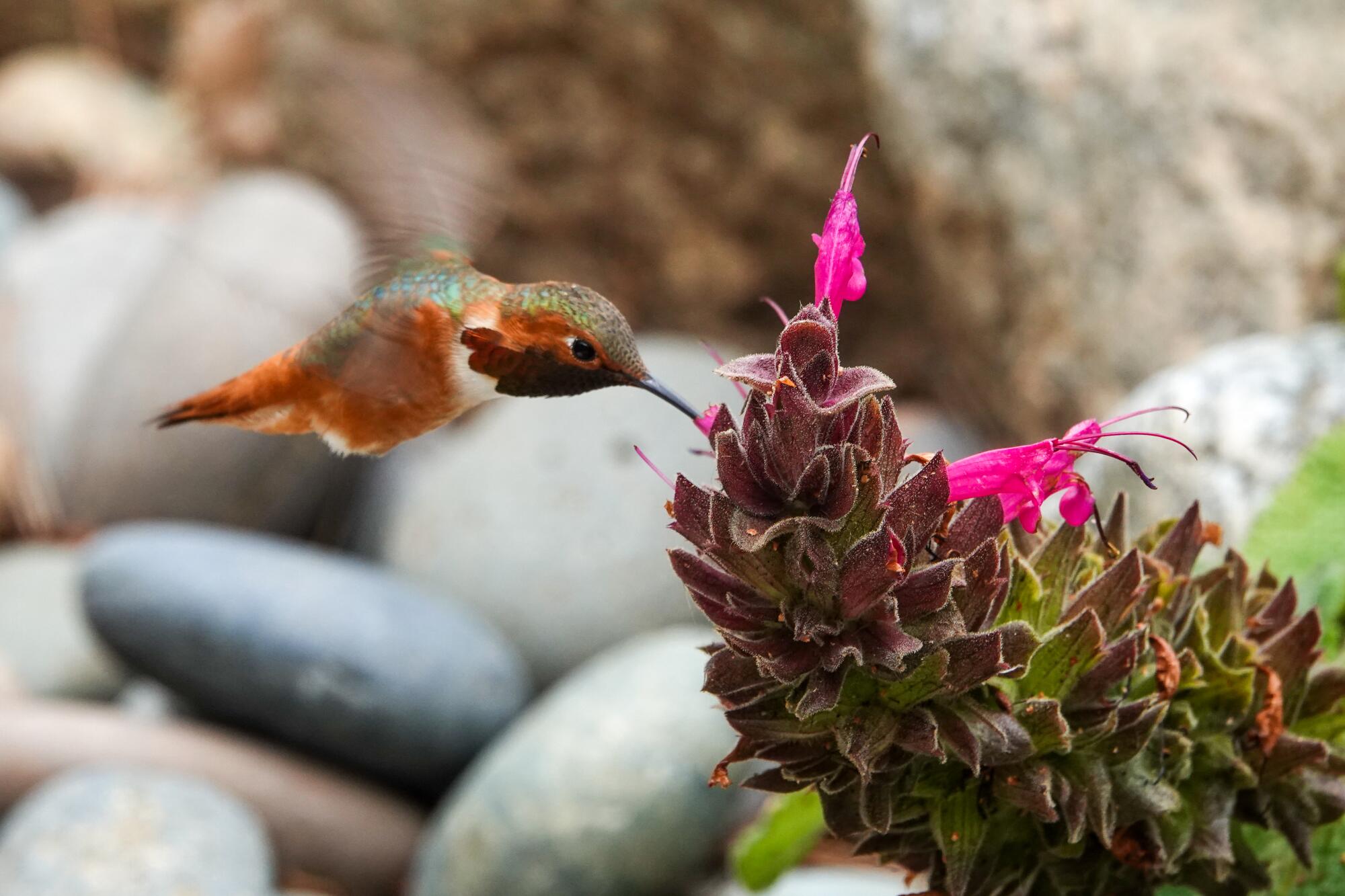
April 16
The Conejo Valley Audubon Society’s 5th Bird-Friendly Garden Tour involves self-guided tours of 15 gardens at private homes, a school and a park in Oak Park, Camarillo, Thousand Oaks and Ventura from 9 a.m. to 3 p.m. The tours are designed to showcase native plant landscapes and habitat gardens that support birds. The tours are free, but online registration for each attendee is required by April 7. Dogs are not permitted on the tours. conejovalleyaudubonsociety.org
The Creative Arts Group 28th Art of the Garden Tour includes self-guided tours of four gardens in the foothill communities of Pasadena, San Marino and Sierra Madre from 10:30 a.m. to 4 p.m. Tickets are $40 if purchased before April 16 and $45 on the day of the tour. The tour is the biggest annual fundraiser for the group, which is entering its 63rd year as a community nonprofit. Executive Director Gwen Robertson said the tour strives to includes at least one blockbuster estate and one more modest but still inspiring homeowner-designed habitat garden. Photography, pets and children under 12 are not permitted on the tours. The Creative Arts Group Gallery will be open at 108 N. Baldwin Ave. in Sierra Madre for people who want to purchase tickets in person and view work by more than 25 local artists. creativeartsgroup.org
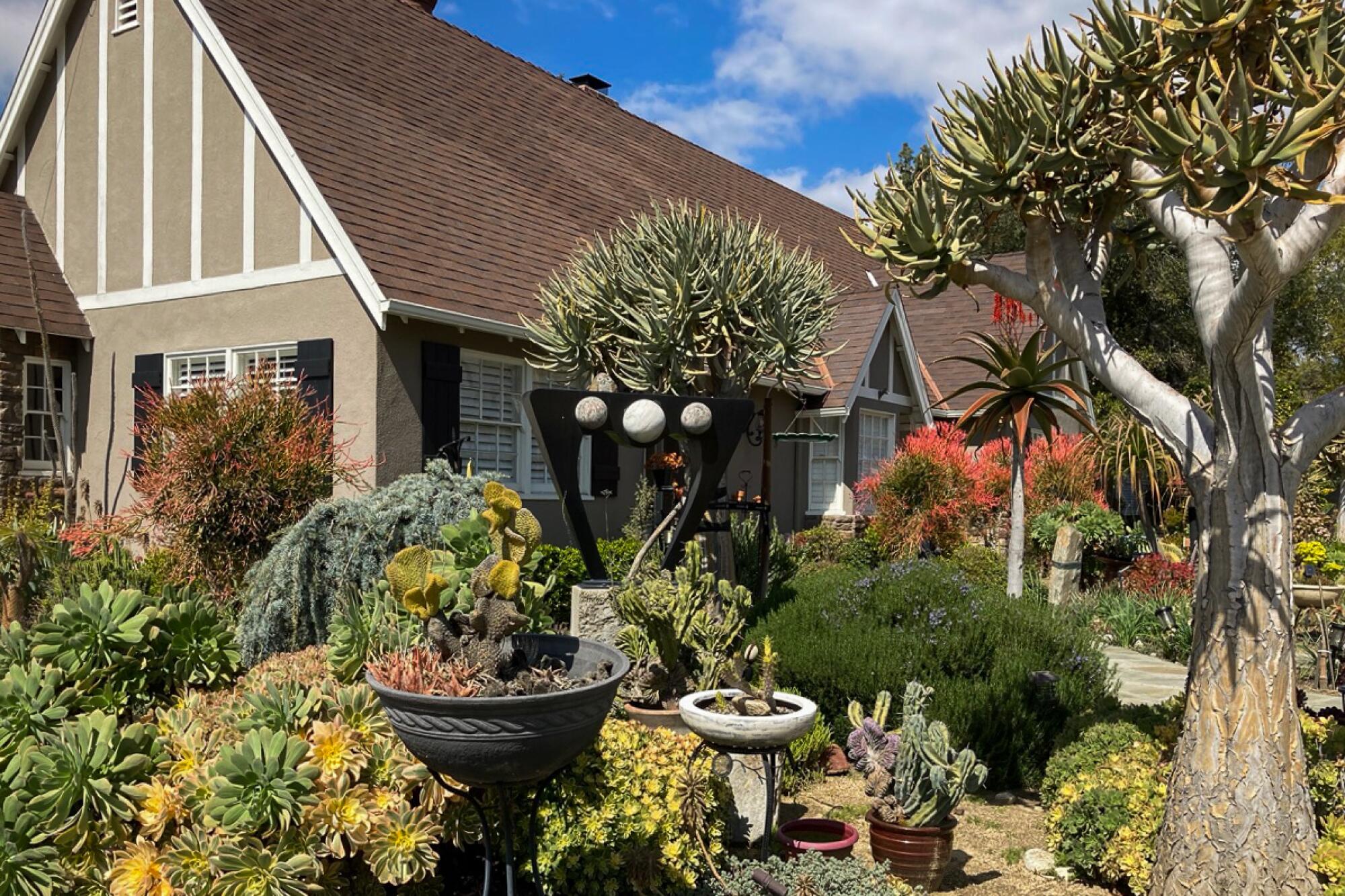
April 23
Claremont Eclectic: A Tour of Six Local Gardens from 1 to 4:30 p.m. around the city of Claremont, as well as two entries into the California Botanic Garden in Claremont, the state’s largest botanic garden devoted to California native plants, the day of the tour and once again in May. The self-guided tours begin at the botanic garden parking lot, 1500 N. College Ave., where ticket holders with a receipt can get their tour maps and brochures. Proceeds support the Claremont Garden Club. Tickets are $20 and can be purchased in person at Claremont Heritage in Memorial Park, 840 N. Indian Hill Blvd., or Rio de Ojas at 250 N. Harvard Ave. as well as online. claremontgardenclub.org
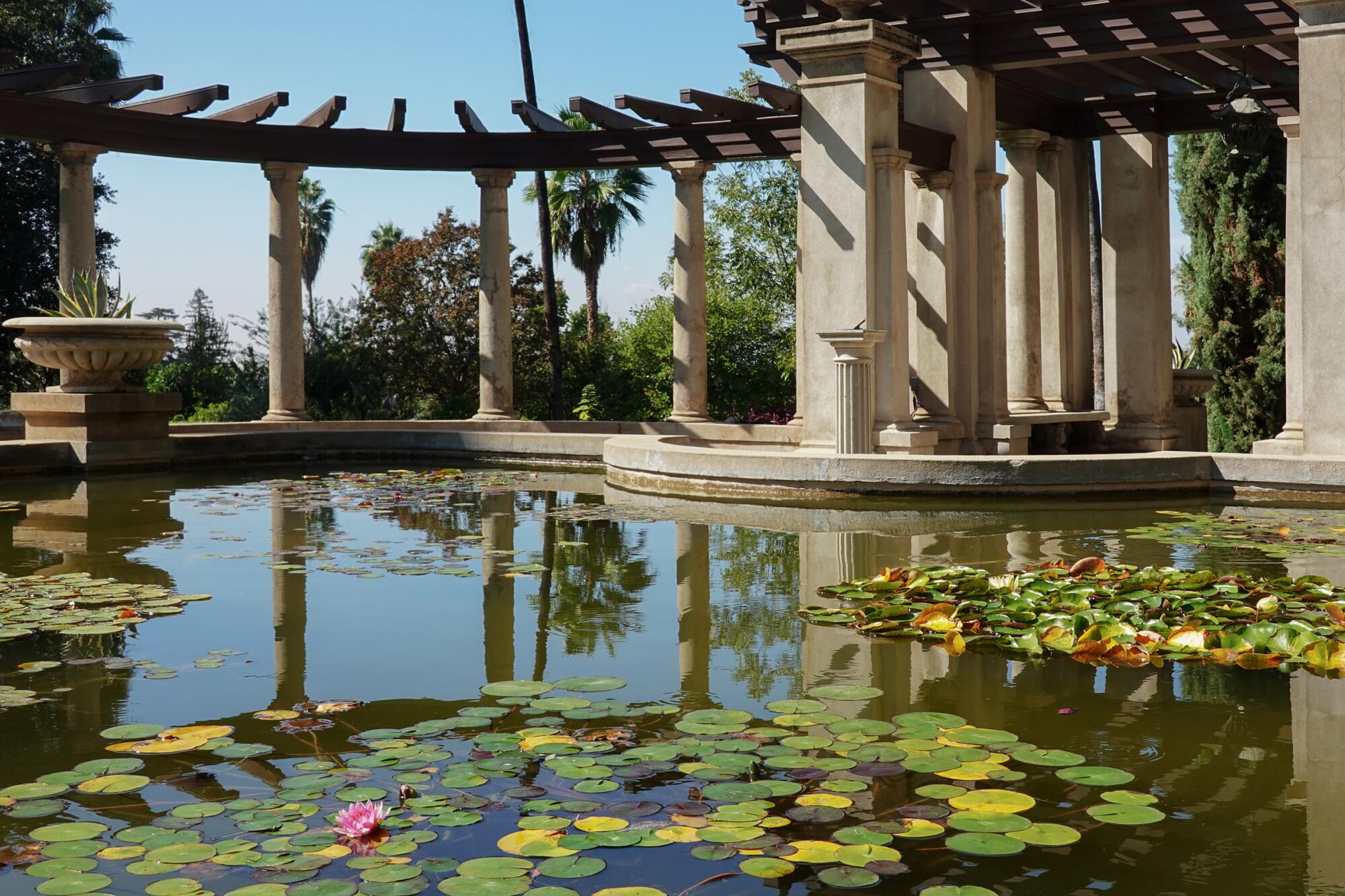
April 22-23
The Redlands Garden Tour, sponsored by the Redlands Horticultural and Improvement Society, features six private gardens representing a broad variety of garden landscaping, including hillside gardens, a yard filled with colorful mosaics and other repurposed yard art, a 5-acre garden where you can feed the ducks and the stately Kimberly Crest Gardens surrounding the mansion built in 1897. The self-guided tours are available from 10 a.m. to 4 p.m. both days. Tickets are $15 (children 13 and younger enter free) and must be purchased with cash or check only at the Asistencia, 26930 Barton Road in Redlands. redlandsgardenclub.org
April 23
The Garden Conservancy Pasadena Open Days Tour: Explore four elaborate private gardens at historic homes in Pasadena. Tickets are $10 per garden ($5 for members) and available online only. Children 12 and under enter free with an accompanying adult. gardenconservancy.org
The Morongo Basin Conservation Assn. Desert-Wise Landscape Tour is scheduled from 9 a.m. to 4 p.m. The event features self-guided tours of five water-wise Morongo Basin landscapes in Yucca Valley, Joshua Tree and Landers, along with docent-guided visits to the Mojave Desert Land Trust and Joshua Basin Water District Demonstration Garden. Tickets are $10 ($5 for members) and can be purchased online. The website also features videos of “desert-wise” landscapes from past tours. mbconservation.org
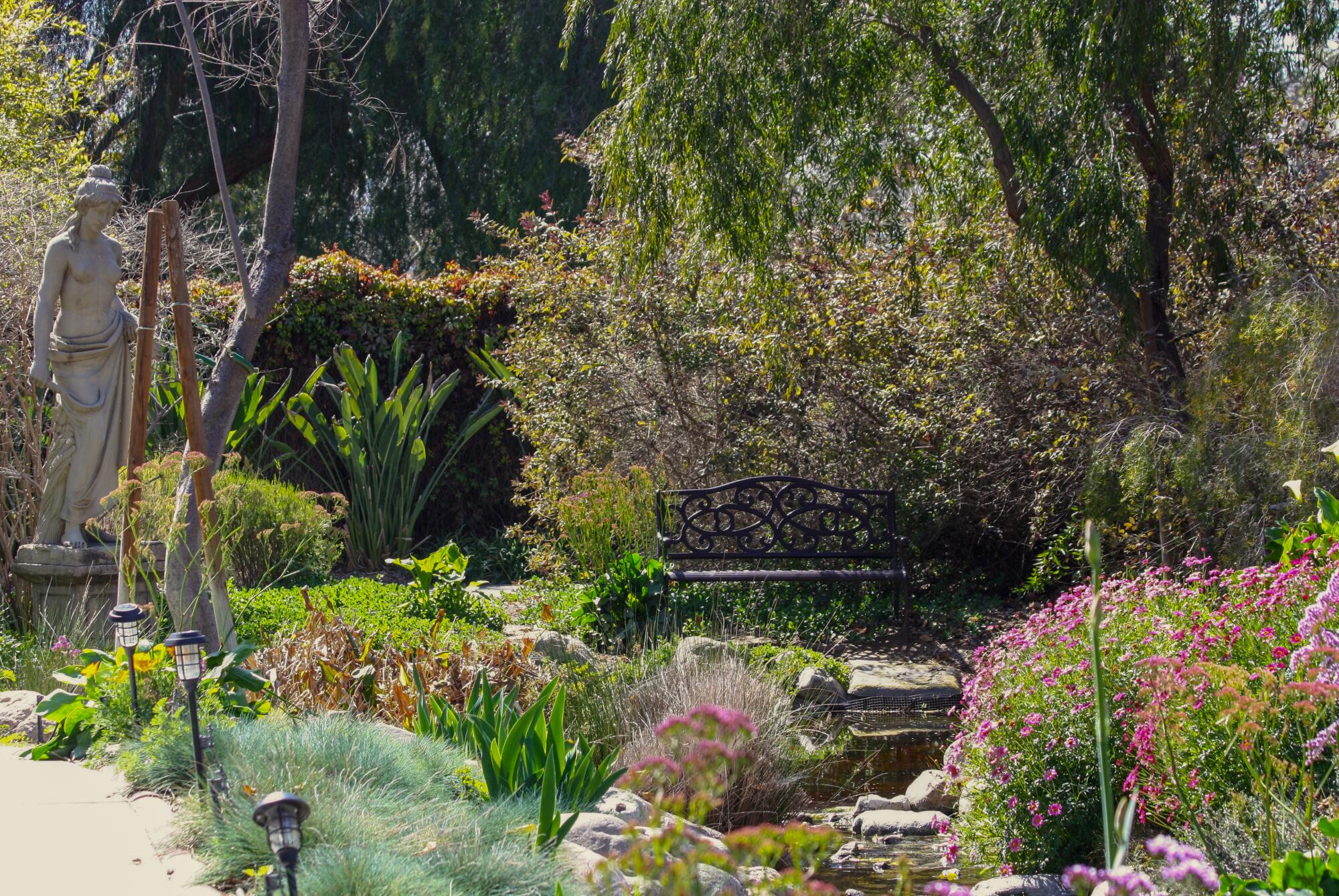
April 29-30
The Riverside Community Flower Show & Garden Tours’ Diamond Jubilee Festival of Flowers celebrates its 75th year with self-guided tours in nine Riverside-area gardens between 10 a.m. and 5 p.m. both days, along with a free flower show at the Elks Lodge, 6166 Brockton Ave., from 9 a.m. to 5 p.m. with floral displays, crafts and garden art for sale. A wristband for admission is $10, children under 16 enter free. riversideflowershow.com
The 30th Floral Park Home & Garden Tour in North Santa Ana features tours of historic homes and gardens from the 1920s to the 1950s from 10 a.m. to 4 p.m. both days. The tour also includes a vintage automobile display, food from local restaurants, a beer and wine garden and shopping opportunities. Proceeds support community scholarships and nonprofit organizations. Tickets for the tour are $45 if purchased ahead online by April 24 or $50 if purchased the day of the event. floralparkhometour.com
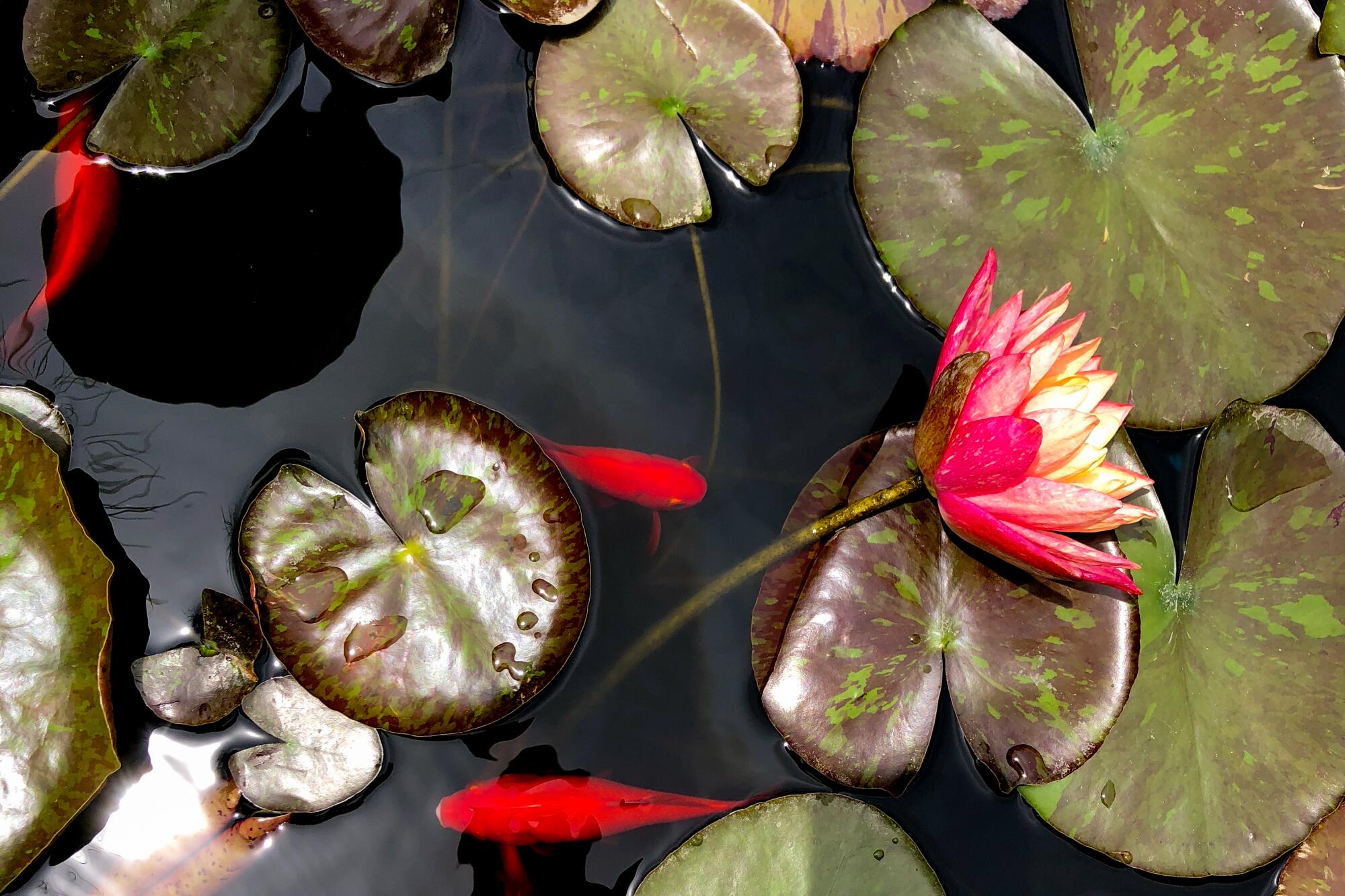
May 6
The Leimert Park Garden Tour is a biennial tour of eight private residential gardens in one of Los Angeles’ most historic neighborhoods, bounded roughly by Crenshaw Boulevard, Exposition Boulevard, Arlington Avenue and Vernon Avenue. The self-guided tours run from 11 a.m. to 5 p.m. Tickets are $20 in advance online or $25 if purchased the day of the event at the Garden Tour Hub at the Baldwin Hills Crenshaw Mall, 3650 W. Martin Luther King Jr. Blvd. The hub will also feature artisan vendors from 10 a.m. to 3:30 p.m. Children under 13 can join the tours for free when accompanied by a ticketed adult, but pets and strollers are not permitted in the backyards of the gardens. leimertparkgardentour.com
The Garden Conservancy Los Angeles Open Days Tours in Santa Monica: Explore four private gardens in Santa Monica — the Urban Wildlife Habitat, the Edna May Garden, Casa Nancina and the Adams Family Garden. Tickets are $10 per garden ($5 for members) and available online only. Children 12 and under enter free with an accompanying adult. gardenconservancy.org
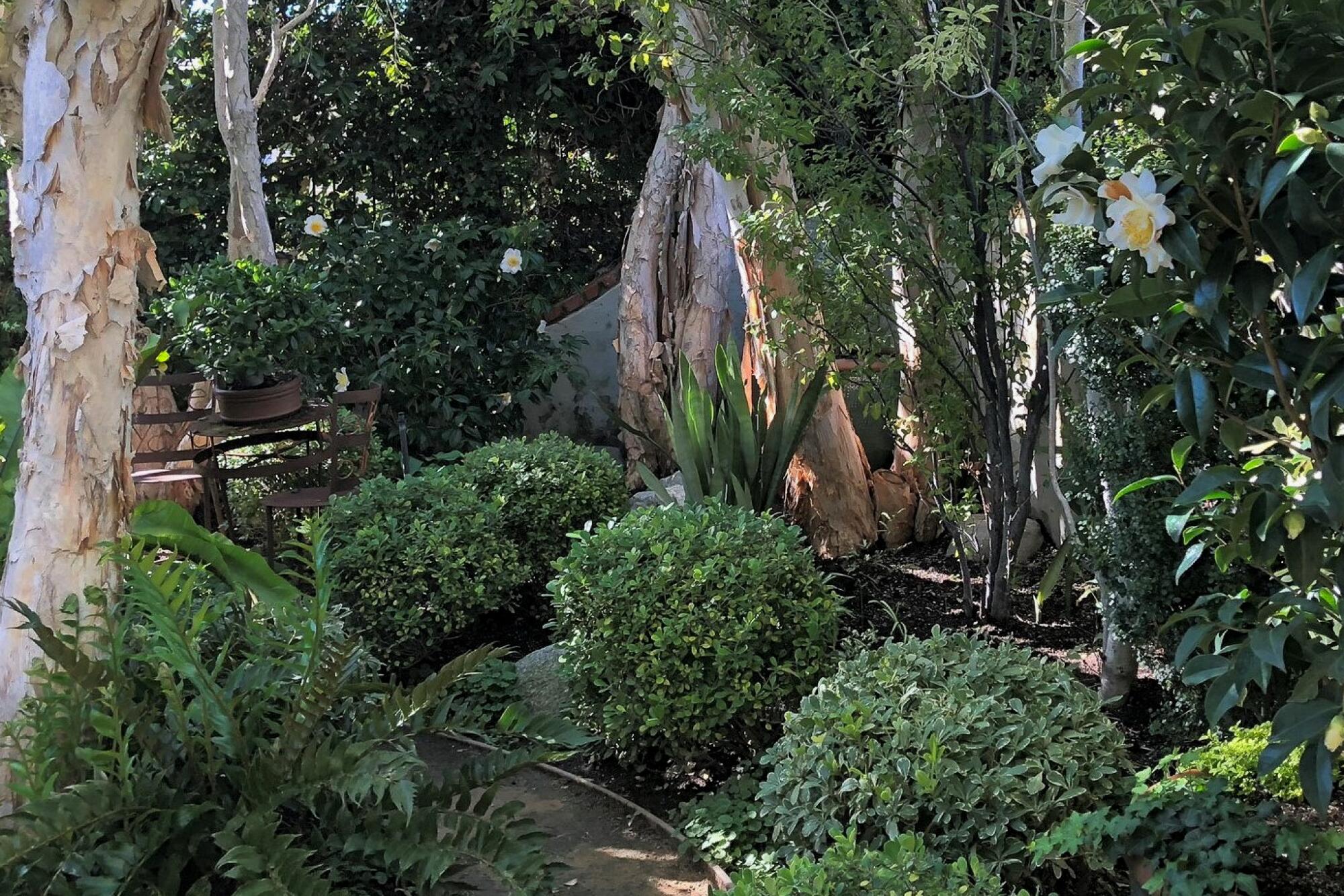
The Laguna Beach Garden Club 18th Gate & Garden Tour begins at the Laguna Beach County Water District’s Bruce Scherer Waterwise and Fire-Safe Gardens at 306 3rd St. in Laguna, with special buses shuttling ticket holders to tours of seven Laguna-area gardens. Mexican fare and artisanal margaritas will be available for purchase along with free homemade baked goods. Artists will be painting canvases in several gardens and visitors wearing a “festive garden party hat” will be entered in the tour’s hat contest. Proceeds support school gardens, local scholarships and community projects; last year’s event netted more than $40,000. The tours run from 10 a.m. to 4 p.m, with the last entry scheduled at 2 p.m. Children are not permitted. Timed-entry tickets purchased by April 28 are $60 or $80 for entry anytime between 10 a.m. and 2 p.m. along with tickets for one food item and one drink. lagunabeachgardenclub.org
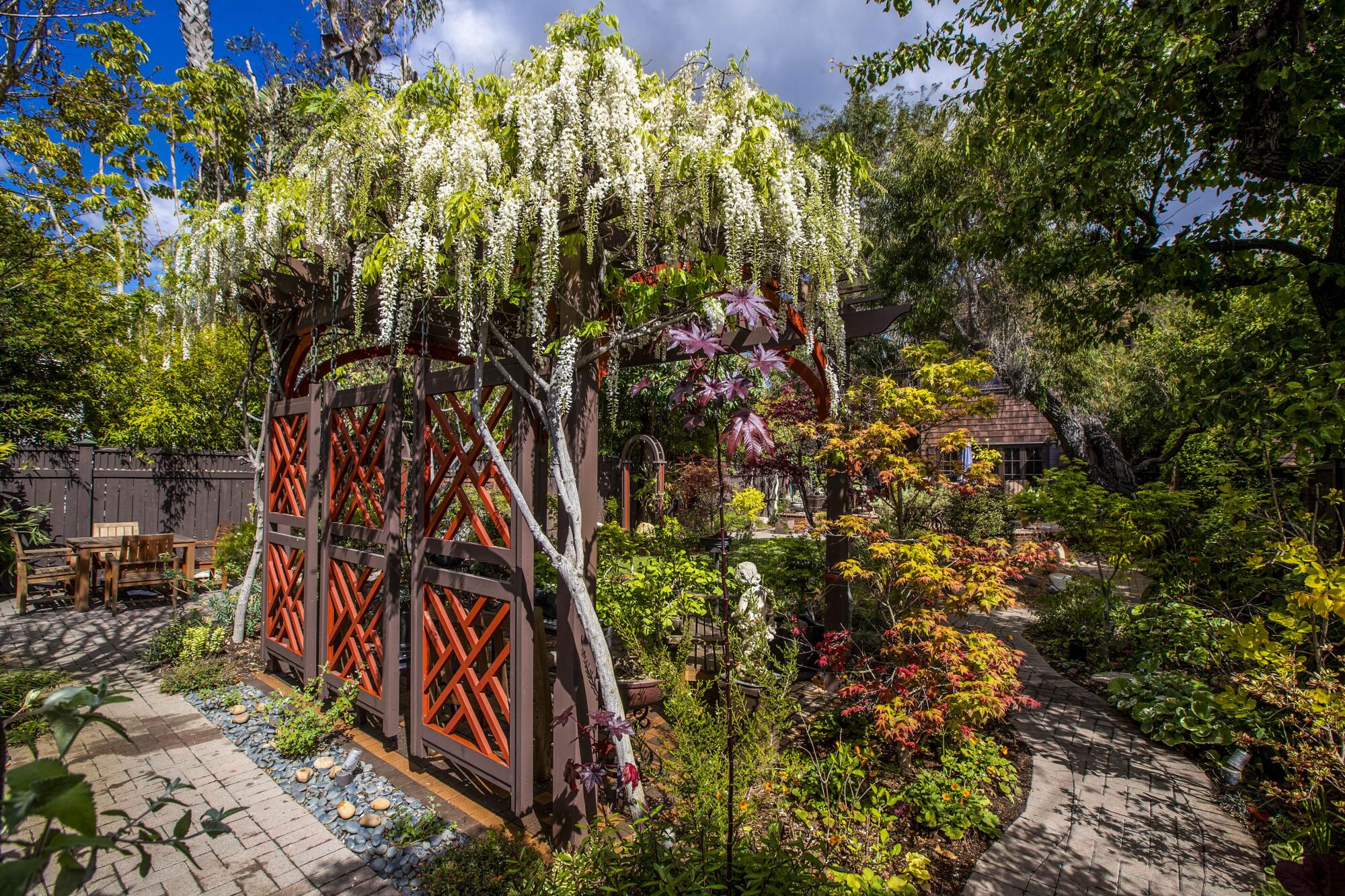
May 6-7
The Mary Lou Heard Memorial Garden Tour features self-guided tours of 43 gardens — 14 of which are new to the tour — from Long Beach to San Clemente from 10 a.m. to 5 p.m. both days. A list of the gardens and their addresses is on the Mary Lou Heard Foundation website, but plan ahead because some of the gardens are open to visitors on only one of the days. The tour is free but donation jars will be set out at the gardens to support the Sheepfold, a crisis center for women and children in Orange that has long been the beneficiary of the foundation’s annual tours. heardsgardentour.com
May 7
The 25th Livingston Memorial Visiting Nurse Assn. & Hospice Camarillo Garden Tour features art exhibits and demonstrations, live music, refreshments and a garden-themed boutique in addition to tours of five Camarillo gardens from noon to 4 p.m. Artists from the Pastel Society of the Gold Coast will give demonstrations at each garden. Tickets are $30 online. Proceeds benefit the association’s hospice program in Camarillo. lmvna.org
May 11
The 26th Newport Harbor Home & Garden Tour features stops at seven homes and gardens near Newport Harbor High School, along with lunch, a “boutique” of home decor and accessories vendors and an afternoon reception at Barclay Butera Interiors between 9 a.m. and 5 p.m. The home and garden tours are from 10 a.m. to 3 p.m. The event is a fundraiser for the Newport Harbor Educational Foundation to support academic programs and faculty at Newport Harbor High School. Tickets can be purchased online for $100 ($110 after April 28, if still available). newportharborhometour.com
May 13
West Floral Park and Jack Fisher Park Neighborhoods Open Garden Day features eight garden tours in two tree-lined neighborhoods of vintage homes in North Santa Ana, along with live music, art displays, garden talks and demonstrations, cooking demonstrations and vendors selling food and garden products from 10 a.m. to 4 p.m. Ticket sales begin March 27 online for $20, or $25 if purchased the day of the event, at West Santa Clara and North Westwood avenues in Santa Ana. opengardenday.com
May 20
San Clemente Garden Club 2023 Garden Tour features self-guided tours and live entertainment at five San Clemente-area gardens from 10 a.m. to 4 p.m. Tickets can be purchased online before the event for $35 ($30 each if purchasing four or more). Day-of tickets are $45 and must be purchased in person, at a location that will be announced on the website after 6 p.m. on May 19. Proceeds from the tour support the San Clemente Garden Club College Scholarship and Junior Gardeners programs as well as conservation organization and civic beautification projects in the city of San Clemente. sanclementegardenclub.com
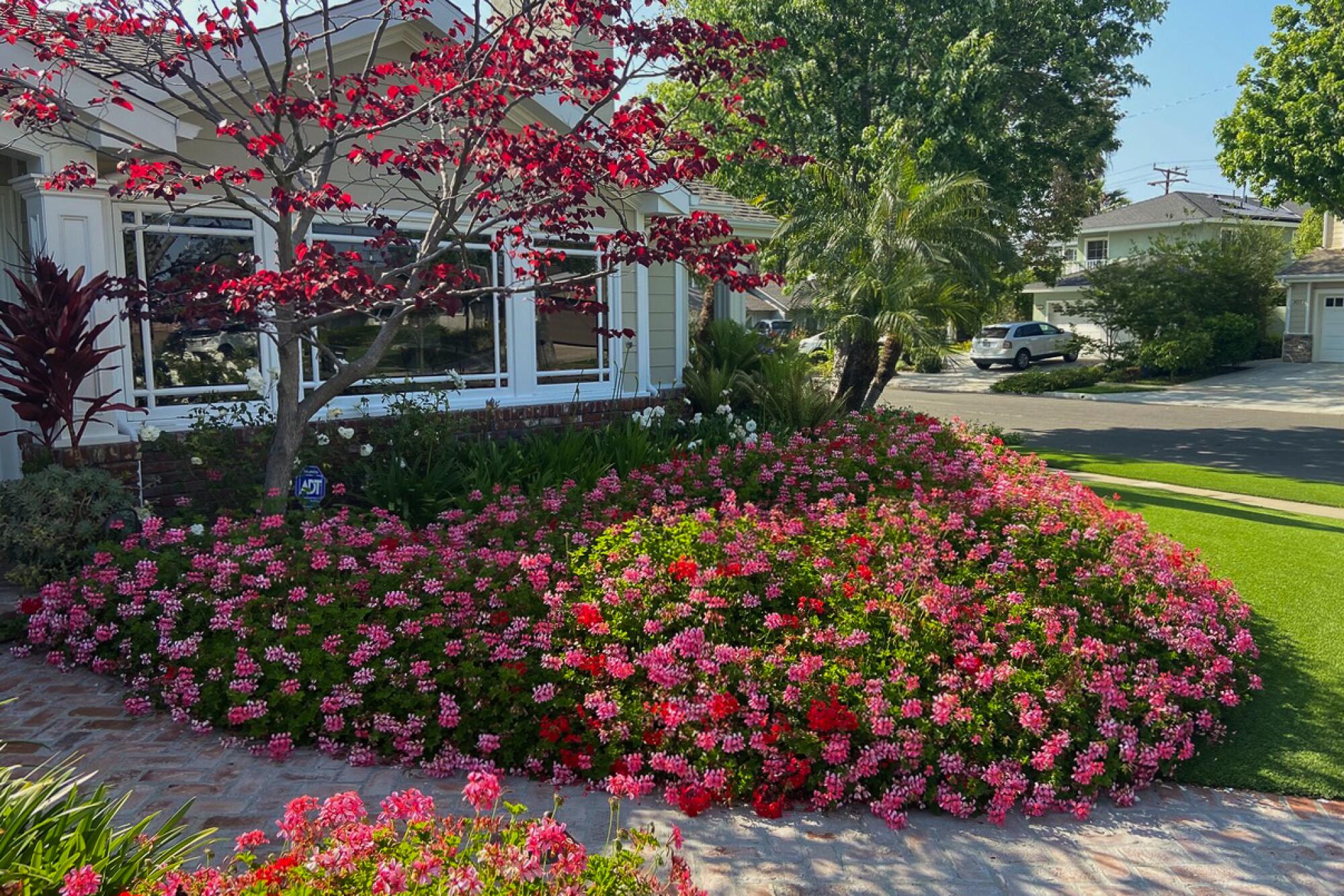
May 21
The Rossmoor Woman’s Club 19th Garden Tour features self-guided tours of six private gardens in the Rossmoor-Los Alamitos area of Orange County, just north of Seal Beach, from 10 a.m. to 4 p.m. Tickets are $20. They can be purchased online after April 15, at several area shops or, on the day of the tour, at the club’s outdoor marketplace, featuring music, food, craft and plant sales in Arbor Village, 10651 Los Alamitos Blvd. in Los Alamitos. Net proceeds from the tours support local charities. rossmoorwomansclub.org
More to Read
Updates
5:51 p.m. March 27, 2023: This story was updated to include details about the Conejo Valley Audubon Society’s 5th Bird-Friendly Garden Tour on April 16 and the May 6 Leimert Park Garden Tour.
Sign up for The Wild
We’ll help you find the best places to hike, bike and run, as well as the perfect silent spots for meditation and yoga.
You may occasionally receive promotional content from the Los Angeles Times.

